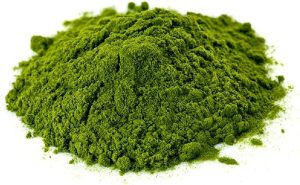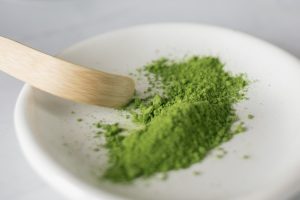
- Overview of Green Algae Powder
- Brief History of Green Algae Powder
- Functions of Green Algae Powder
- Recommended Daily Intake (RDI), Recommended Dietary Allowance (RDA), Adequate Intake (AI), or Reference Nutrient Intake (RNI) for Green Algae Powder
- Deficiency of Green Algae Powder
- Food Sources of Green Algae Powder and Where to Get It From
- Green Algae Powder and Its Interaction with Other Medications
- Websites and Articles to Delve into the Benefits of Green Algae Powder
- Disclaimer
Overview of Green Algae Powder
Green algae powder is a nutrient-rich dietary supplement derived from diverse species of green algae. Packed with chlorophyll, it provides antioxidants, potentially aiding detoxification and combating oxidative stress.
With notable protein content, it serves as a plant-based protein source for vegetarians and vegans. Offering vitamins (A, C, B) and essential minerals (iron, magnesium, calcium), green algae contribute to overall nutrition. Some species provide omega-3 fatty acids, promoting cardiovascular health.
Known for potential anti-inflammatory effects, green algae may support immune function. Available in various forms, including capsules and powder, it can be easily incorporated into smoothies and recipes. Sustainability-minded, green algae cultivation shows promise as an environmentally friendly nutrient source.
Choosing high-quality supplements is crucial for safety and efficacy, and consulting healthcare professionals before supplementation is advisable for individual health considerations.
Brief History of Green Algae Powder
A brief history of green algae powder involves its origins in the utilization of various species of green algae for nutritional and health-related purposes. While the exact timeline can be challenging to pinpoint, key developments include:
- Historical Algae Use:
- Traditional cultures, especially those with access to water bodies, likely consumed various forms of algae for sustenance. Seaweeds and algae have historical significance in Asian cuisines.
- Nutritional Discoveries:
- Scientific exploration revealed the rich nutritional composition of green algae, including chlorophyll, protein, vitamins, minerals, and omega-3 fatty acids.
- Cultivation and Processing Advances:
- Advances in cultivation and processing techniques enabled the extraction and concentration of nutrients from green algae, leading to the development of algae-based supplements, including green algae powder.
- Nutraceutical and Supplement Industry Adoption:
- The nutraceutical and supplement industry recognized the potential health benefits of green algae, leading to the formulation of algae-based products, such as capsules, tablets, and powdered supplements.
- Growing Interest in Plant-Based Nutrition:
- As interest in plant-based nutrition and sustainable food sources increased, green algae powder gained popularity among individuals seeking plant-derived alternatives for various nutrients.
- Research and Health Benefits:
- Ongoing scientific research has explored the potential health benefits of green algae, contributing to its reputation as a nutrient-dense supplement with antioxidant, anti-inflammatory, and detoxification properties.
- Environmental Considerations:
- Green algae cultivation has garnered attention for its potential environmental sustainability, as certain algae species can grow rapidly and thrive in diverse conditions.
- Modern-Day Availability:
- Today, green algae powder is commercially available, and consumers can easily incorporate it into their diets as a convenient and versatile nutritional supplement.
While the historical use of algae in traditional diets is well-established, the specific history of green algae powder as a modern supplement is more recent and closely tied to advancements in nutrition science and the growing interest in plant-based health solutions.
Functions of Green Algae Powder
Green algae powder, derived from various species of green algae, offers a range of potential health benefits due to its rich nutritional composition. Here are some functions and potential benefits associated with the consumption of green algae powder:
- Nutrient-Rich Composition:
- Green algae powder is a dense source of nutrients, including chlorophyll, proteins, vitamins (A, C, B), minerals (iron, magnesium, calcium), and omega-3 fatty acids.
- Antioxidant Properties:
- The chlorophyll and other bioactive compounds in green algae possess antioxidant properties, helping to neutralize free radicals and reduce oxidative stress.
- Detoxification Support:
- Chlorophyll in green algae is believed to aid in detoxification by binding to and eliminating certain toxins and heavy metals from the body.
- Protein Source:
- Green algae provide plant-based protein, making them a suitable supplement for individuals following vegetarian or vegan diets.
- Cardiovascular Health:
- Some green algae species contribute to cardiovascular health by providing omega-3 fatty acids, particularly eicosapentaenoic acid (EPA) and docosahexaenoic acid (DHA).
- Anti-Inflammatory Effects:
- Certain components of green algae may have anti-inflammatory properties, potentially assisting in the management of inflammation within the body.
- Immune System Support:
- The vitamins, minerals, and other bioactive compounds in green algae may contribute to supporting and strengthening the immune system.
- Potential Cognitive Benefits:
- Omega-3 fatty acids in some green algae species are associated with cognitive health, potentially supporting brain function and reducing the risk of neurodegenerative conditions.
- Environmental Sustainability:
- Certain types of green algae are cultivated for their environmental sustainability, as they can grow rapidly and require minimal resources compared to traditional crops.
- Versatile Dietary Supplement:
- Green algae powder is available in various forms, such as capsules, tablets, and powder, making it easy to incorporate into smoothies, beverages, or recipes for added nutritional benefits.
While green algae powder offers various potential health functions, individual responses can vary, and it’s essential to choose high-quality supplements from reputable sources. Consulting with healthcare professionals before incorporating such supplements into the diet is advisable, especially for individuals with existing health conditions or specific dietary needs.
Recommended Daily Intake (RDI), Recommended Dietary Allowance (RDA), Adequate Intake (AI), or Reference Nutrient Intake (RNI) for Green Algae Powder
There isn’t a specific Recommended Daily Intake (RDI), Recommended Dietary Allowance (RDA), Adequate Intake (AI), or Reference Nutrient Intake (RNI) established for green algae powder. These recommendations are typically established for specific nutrients like vitamins and minerals rather than whole foods or supplements.
Green algae, such as spirulina or chlorella, are often consumed as supplements due to their nutritional content. However, recommendations for their intake can vary based on factors such as an individual’s age, sex, health status, and specific nutritional needs.
It’s important to note that while green algae can be a good source of various nutrients, including protein, vitamins, and minerals, excessive intake may not always be beneficial and could even have adverse effects in some cases. If you are considering incorporating green algae powder into your diet, it’s advisable to consult with a healthcare professional or a registered dietitian to determine the appropriate dosage based on your individual health and nutritional needs.
Keep in mind that recommendations and guidelines may have evolved since my last update, so it’s a good idea to check with authoritative sources, such as health agencies or nutritional experts, for the most current information.
Deficiency of Green Algae Powder
Green algae powder, such as spirulina or chlorella, is often consumed for its nutritional benefits. While these supplements are nutrient-rich, deficiencies related specifically to green algae powder are not well-documented. However, it’s important to note that individual reactions to supplements can vary, and excessive consumption of any supplement may lead to adverse effects.
Here are some considerations regarding green algae powder:
- Contaminants:
- Ensure that the green algae powder you are consuming is sourced from reputable sources and undergoes rigorous testing for contaminants. Contaminated algae supplements may have adverse health effects.
- Iodine Content:
- Some green algae supplements, particularly spirulina, may contain iodine. While iodine is essential for thyroid function, excessive intake can lead to thyroid issues. Individuals with thyroid disorders or iodine sensitivity should be cautious and consult with a healthcare professional.
- Individual Sensitivity:
- People may have individual sensitivities or allergies to specific components of green algae. If you experience any adverse reactions, discontinue use and seek medical advice.
- Nutrient Imbalance:
- Relying heavily on one supplement, even a nutrient-dense one like green algae powder, might result in an imbalance of other nutrients. A varied and balanced diet is crucial for overall health.
- Digestive Issues:
- Some individuals may experience digestive issues, such as gas or bloating, when consuming green algae powder. If this occurs, adjusting the dosage or discontinuing use may be necessary.
- Interactions with Medications:
- Green algae supplements may interact with certain medications. If you are taking medications, especially blood thinners or immunosuppressants, consult with your healthcare provider before adding these supplements to your routine.
As with any dietary supplement, it’s crucial to approach green algae powder with moderation and consider your individual health circumstances. Before incorporating any new supplement into your routine, it’s advisable to consult with a healthcare professional or a registered dietitian. They can provide personalized advice based on your health history, dietary needs, and potential interactions with medications.
Food Sources of Green Algae Powder and Where to Get It From
Green algae powders, such as spirulina and chlorella, are often available as dietary supplements. They are derived from different types of microscopic algae and are known for their high nutritional content. Here are common sources of green algae powder and where you can find them:
- Health Food Stores:
- Many health food stores, both physical retailers and online, carry green algae powder supplements. These supplements are often available in various forms, including powder, capsules, or tablets.
- Online Retailers:
- Numerous online platforms and retailers specialize in health and wellness products. You can find a variety of green algae powders from reputable brands on websites like Amazon, iHerb, Vitacost, and others.
- Natural and Organic Grocery Stores:
- Some natural or organic grocery stores may carry green algae powder in the supplements or superfoods section. Check with your local health food store or grocery store that focuses on organic products.
- Specialty Supplement Shops:
- Specialty supplement shops often carry a range of nutritional supplements, including green algae powder. These stores may provide more options and knowledgeable staff to help you make informed choices.
- Pharmacies:
- Some pharmacies or drugstores may have a selection of dietary supplements, including green algae powder. Check the health and wellness section of your local pharmacy.
- Farmers’ Markets:
- In certain regions, farmers’ markets or specialty food markets may feature vendors selling health and superfood products, including green algae powder.
When purchasing green algae powder, it’s essential to choose products from reputable brands that undergo testing for contaminants and adhere to quality standards. Look for certifications such as organic, non-GMO, and third-party testing to ensure product quality.
It’s also advisable to consult with a healthcare professional or a registered dietitian before adding any new supplement to your diet. They can provide personalized advice based on your individual health needs and circumstances. Additionally, follow the recommended dosage instructions on the product label to avoid potential adverse effects.
Green Algae Powder and Its Interaction with Other Medications
Green algae powder supplements, such as spirulina or chlorella, are generally considered safe for most people when used in moderation. However, there is the potential for interactions with certain medications. Before adding green algae powder or any new supplement to your routine, it’s crucial to consult with your healthcare provider, especially if you are taking prescription medications. Here are some considerations regarding the interaction of green algae powder with medications:
- Blood Thinners (Anticoagulants):
- Green algae supplements may contain vitamin K, which plays a role in blood clotting. If you are taking blood thinners (anticoagulants) like warfarin, it’s important to maintain a consistent intake of vitamin K. Consult with your healthcare provider before adding green algae powder to your diet.
- Immunosuppressant Medications:
- Individuals taking immunosuppressant medications, such as those used after organ transplants or for autoimmune conditions, should consult with their healthcare provider. Green algae supplements may have immune-boosting properties, and the interaction with immunosuppressants is not well-studied.
- Iodine Sensitivity or Thyroid Medications:
- Some green algae supplements, particularly spirulina, may contain iodine. If you have iodine sensitivity or are taking thyroid medications, consult with your healthcare provider before using green algae powder, as excessive iodine intake could affect thyroid function.
- Iron Absorption:
- Green algae may contain compounds that could inhibit the absorption of non-heme iron (plant-based iron) in the gastrointestinal tract. If you are taking iron supplements for anemia or other reasons, take them separately from green algae supplements.
- Other Medications:
- While green algae supplements are generally safe, it’s advisable to check for potential interactions with any specific medications you are taking. This is particularly important if you are on medications for chronic conditions or have underlying health concerns.
Always disclose your full list of medications, including supplements, to your healthcare provider to ensure that there are no potential interactions. They can provide personalized advice based on your medical history and the specific medications you are taking.
Remember that the information provided here is general in nature, and individual responses to supplements and medications can vary. Professional medical guidance is crucial for making informed decisions about your health and well-being.
Websites and Articles to Delve into the Benefits of Green Algae Powder
To learn more about the benefits of green algae powder, including spirulina and chlorella, you can explore reputable websites and articles that provide reliable information. Here are some sources to get you started:
- National Institutes of Health (NIH) – Office of Dietary Supplements:
- Website: NIH Office of Dietary Supplements
- The NIH ODS provides evidence-based information on dietary supplements, including fact sheets on specific nutrients and supplements.
- Mayo Clinic:
- Website: Mayo Clinic – Supplements
- Mayo Clinic offers reliable health information, and their website includes an expert answer section on spirulina.
- WebMD:
- Website: WebMD – Spirulina
- WebMD provides information on various health topics, including an overview of spirulina.
- Examine.com:
- Website: Examine.com – Spirulina
- Examine.com is an independent and unbiased resource that provides in-depth information on supplements, including spirulina.
- World Health Organization (WHO):
- Website: WHO – Spirulina
- The WHO provides information on the nutritional aspects and potential health benefits of spirulina.
- PubMed:
- Website: PubMed
- Search for scientific articles and studies on green algae powder, spirulina, or chlorella to access peer-reviewed research.
- Healthline:
- Website: Healthline – Spirulina
- Healthline offers articles written by experts, and this page provides an overview of the proven benefits of spirulina.
- Natural Medicines Database:
- Website: Natural Medicines Database
- The Natural Medicines Database provides evidence-based information on supplements, including monographs on spirulina and chlorella.
Remember to critically evaluate information and prefer sources that rely on scientific evidence. Additionally, it’s always a good idea to consult with a healthcare professional or a registered dietitian for personalized advice based on your health status and specific needs.
Disclaimer
The information is solely provided for educational purposes. It is not intended to diagnose, treat, cure, or prevent any disease. Seek the advice of your physician or qualified healthcare provider with any questions you may have regarding a medical condition at all times. Never disregard professional medical advice because of something you have read or learned from this article.






